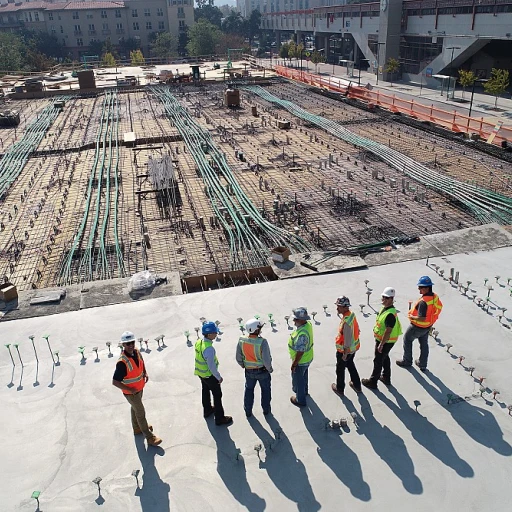
Understanding the Role of a DevOps Engineer
Grasping the Basics of DevOps Engineering
In today’s fast-paced tech environment, understanding the ins and outs of DevOps engineering is crucial for building a robust software development team. A DevOps engineer acts as a bridge between the development and operations teams, ensuring seamless integration, efficient deployment, and effective use of tools.
When you aim to hire DevOps professionals, keep in mind their pivotal role in managing infrastructure as code and maintaining continuous integration and deployment pipelines. Their expertise in cloud platforms like AWS or their ability to handle various project environments can significantly impact your development operations.
Key Responsibilities and Required Skills
- Implementing and ensuring continuous integration and delivery (CI/CD) practices.
- Building and maintaining scalable infrastructure, which involves cloud engineering.
- Collaborating with software developers to address issues during the development and deployment processes.
- Expertise in configuration management tools such as Ansible, Puppet, or Chef.
- Proficiency in scripting languages, including Python, Bash, or Shell scripting.
- Experience years in managing system updates, patches, and releases across development environments.
Make sure to look for candidates who demonstrate not just strong technical skills but also effective communication abilities since they will need to work closely with various teams. In the pursuit of securing well-suited talent, exploring events like the TechNet Career Fair can be an important step in your hiring journey.
Crafting the Perfect Job Description
Essential Ingredients of a Compelling Job Description
Creating an enticing job description is a pivotal step in hiring a DevOps engineer. It's not just about listing the skills and experience required; it’s about communicating the role's significance within the software development team and how it aligns with the organization’s cloud engineering initiatives. A well-crafted job description should convey the core responsibilities the candidate will undertake. Highlight the importance of development operations in enhancing infrastructure code, supporting cloud deployments, and ensuring continuous integration. This not only attracts potential candidates but also sets clear expectations from the onset.- Define the Role: Clearly outline the DevOps engineer's role in bridging the gap between software developers and IT operations. Emphasize the significance of their contribution to the team, especially in maintaining efficient project workflows through development and deployment.
- List Required Skills: Specify the technical skills needed, such as experience with AWS tools, infrastructure management, and DevOps methodologies. Highlight attributes like problem-solving capabilities and the ability to work in a dynamic cloud environment.
- Mention Experience Level: Detail the experience years required and clarify if you're seeking senior DevOps engineers or developers with specialized expertise in continuous integration and remote operations.
- Company Culture and Values: Convey your organization's culture and how a DevOps engineer will be instrumental in driving forward cloud-based initiatives and software development projects.
Sourcing Candidates: Where to Look
Finding the Right Talent Pools
When looking to hire a skilled DevOps engineer, the first challenge is knowing where to find the right candidates. Given the increasing demand for DevOps experts, identifying effective sourcing channels is crucial for timely and successful recruitment.Start by considering the following options:
- Professional Networks: Explore professional platforms like LinkedIn, where you can connect with DevOps engineers through mutual connections and industry groups. These platforms often provide insights into a candidate’s specialized expertise and previous project involvement.
- DevOps Communities: Online forums and communities such as GitHub, Stack Overflow, and Reddit are excellent places to find potential candidates who are actively engaged in the field and demonstrate their skills through discussions and practical contributions.
- Job Boards and Recruitment Platforms: Use tech-focused job boards like Indeed, Glassdoor, or specialized sites such as Stack Overflow Jobs and AngelList, which cater specifically to tech talent, including remote opportunities.
- Industry Conferences and Meetups: Attend or sponsor tech events and meetups where you can interact with experienced DevOps professionals. These gatherings can be a goldmine for finding talented engineers who are keeping up with the latest in cloud engineering, continuous integration, and infrastructure code.
- Referrals from Existing Team Members: Leverage your current development team’s network by encouraging them to refer DevOps developers. Personal recommendations often lead to finding highly qualified talent that meshes well with your team’s culture.
By tapping into these diverse talent pools, you increase your chances of discovering top DevOps candidates who will not only meet technical and project requirements, but also seamlessly integrate into your software development team. For further insights on crafting the perfect job description to match these findings, understanding the total job benefits versus employee compensation could significantly guide you in this process.
Interviewing Techniques for DevOps Roles
Mastering the Art of the DevOps Interview
When it comes to hiring a DevOps engineer, the interview process is crucial in assessing not only technical skills but also the cultural and specific needs of your software development team. Here’s how you can refine your interview strategy to ensure you select the right talent...- Technical Assessment: Dive into the candidates' technical expertise with specific questions and practical tests related to infrastructure, code management, and cloud engineering. Don’t just focus on tools like AWS; ensure they have solid experience years in handling continuous integration and infrastructure as code.
- Real-world Scenarios: Incorporate case study-based discussions where the candidates can showcase their experience by solving realistic problems. This type of assessment helps understand their problem-solving skills and how they can leverage development operations expertise in your specific project environment.
- Cultural Alignment: A potential hire should blend well with your team dynamics. Discuss scenarios and ask questions that focus on teamwork, collaboration, and their ability to integrate with remote DevOps practices if it’s a requirement.
- Behavioral Questions: These are paramount to understand the candidates' past behavior in similar work environments. Questions around their past deployment projects, challenges faced, and team collaboration tactics can provide insights into their work ethic and adaptability.
- Hands-on Demonstration: Whenever possible, integrate actual software deployment tasks as part of the interview process. Observing a candidate in action can be invaluable to gauge the immediate application of their skills.
- Feedback and Reflection: Post-interview, gather feedback from all panel members to ensure a holistic view of the candidate. Reflect on both technical expertise and how well they matched the team’s culture and project needs.
Evaluating Technical Skills and Experience
Assessing Technical Expertise and Proficiency
Evaluating a DevOps engineer’s skills is a critical part of the hiring process. The candidate should demonstrate a range of capabilities, from an understanding of software development to cloud infrastructure management. Here's how to ensure your candidate has the experience and technical proficiency your team requires:- Technical Skills Assessment: Use technical assessments or real-life problem-solving scenarios to evaluate the candidate’s ability to manage infrastructure code, continuous integration, and deployment processes. Assessing their familiarity with tools like AWS can provide insight into their capability to handle cloud-based projects.
- Project Experience: Inquire about their past projects, focusing on key achievements and challenges faced. A solid background in development operations, especially with senior DevOps roles, might require at least several years of practical experience. Seek candidates with verified expert skills in remote DevOps scenarios.
- Case Study Analysis: Provide a case study relevant to your business needs for the candidate to review. This exercise showcases how they apply their technical expertise in development environments, manage timelines, and handle project requirements.
- Collaboration and Communication Skills: Even the most technically skilled engineers must work well within a team. Gauge their capability to collaborate with developers, product managers, and other stakeholders. Consider their approach to engaging with the entire development team.
- Continuous Improvement Mindset: Ideal DevOps engineers continuously seek knowledge growth. Ask about recent skills they have learned or certifications they’ve pursued in cloud engineering or infrastructure management to identify candidates committed to development best practices.
Onboarding and Retaining DevOps Talent
Seamless Integration and Skill Enhancement
Once you've successfully hired the right DevOps engineer, the next crucial step is to ensure a smooth onboarding process and ongoing development. DevOps roles require a blend of technical skills and collaborative mindset, making it essential that new hires integrate well within your team and align with your company's objectives.Onboarding Best Practices
- Clear Communication: Begin with a detailed introduction to your company's cloud infrastructure, deployment processes, and the tools you utilize, such as AWS for infrastructure code and continuous integration practices.
- Gradual Induction: Introduce DevOps engineers to your systems in stages, allowing them to get familiar with your software development processes and cloud engineering practices progressively. This method provides them the time to adapt without overwhelming them.
- Mentoring Programs: Pair new hires with senior DevOps staff to facilitate knowledge transfer and practical training. This mentorship can fast-track their understanding of your infrastructure, boosting their confidence and productivity.
Ongoing Development Opportunities
- Skill Development Workshops: Periodic workshops focusing on the latest in development operations and cloud innovations can keep your engineers up to date, nurturing a culture of continuous improvement.
- Encourage Collaboration: Promote regular sessions where DevOps developers, infrastructure engineers, and software developers can share insights from different projects, fostering a lab-like environment of learning and experimentation.
Retention Strategies for DevOps Talent
To retain top DevOps talent, especially those with several years of experience, consider implementing the following strategies:- Career Path Advancement: Outline clear paths for growth within the team. Senior DevOps positions or specialized roles in cloud projects can be integral for those with verified expertise.
- Flexibility and Autonomy: Allow engineers the flexibility to manage their schedules, emphasizing results over rigid time frames. Remote DevOps opportunities can also attract and keep skilled professionals.
- Recognition and Rewards: Regularly recognize contributions and achievements within the team. Enact incentive systems for notable efficiencies in project deployments and innovative software solutions.













